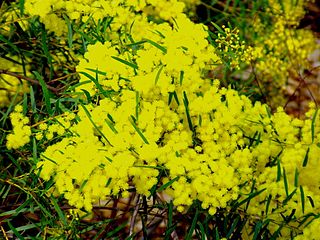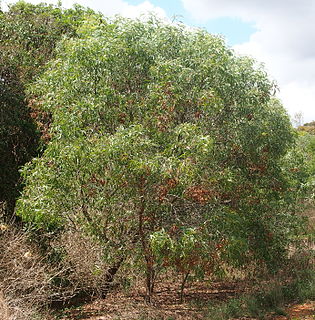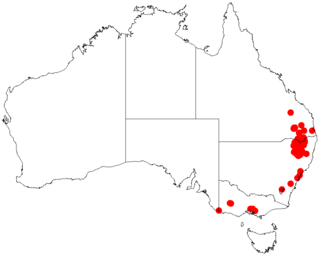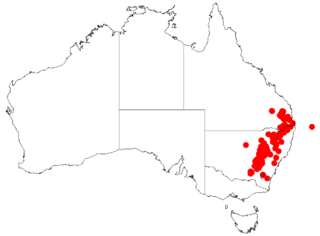
Acacia fimbriata, commonly known as the fringed wattle or Brisbane golden wattle, is a species of Acacia that is native along much of the east coast of Australia.

Acacia deanei is a tree native to Australia, which is useful for controlling soil erosion. There are two subspecies: Acacia deanei subsp. deanei and Acacia deanei subsp. paucijuga.

Acacia blayana, commonly known as Blay's wattle or Brogo wattle, is a tree of the genus Acacia that is native to south eastern Australia.

Acacia leptocarpa, commonly known as north coast wattle, is a shrub or small tree native to New Guinea and coastal regions of northern Australia.

Acacia obliquinervia, known colloquially as mountain hickory or mountain hickory wattle, is a species of Acacia that is endemic to south eastern Australia.

Acacia polybotrya, commonly known the western silver wattle or the hairy feather wattle, is a shrub of the genus Acacia and the subgenus Botrycephalae. It is native to an area in New South Wales and Queensland.

Acacia lateriticola is a shrub of the genus Acacia and the subgenus Pulchellae that is endemic to an area of south western Australia.

Acacia mollifolia, commonly known as the hairy silver wattle, velvet acacia and hoary silver wattle is a species of Acacia native to eastern Australia.

Acacia pruinosa, commonly known as the frosty wattle, is a species of Acacia native to eastern Australia.

Acacia leucoclada, commonly known as the northern silver wattle, is a species of Acacia native to eastern Australia.

Acacia debilis, commonly known as the spindly wattle, is a species of Acacia native to eastern Australia.

Acacia kulnurensis, commonly known as the Kulnura wattle, is a species of Acacia native to eastern Australia.

Acacia loroloba, commonly known as the Ma Ma Creek wattle, is a species of Acacia native to eastern Australia.

Acacia gladiiformis, commonly known as sword wattle or sword-leaf wattle, is a shrub belonging to the genus Acacia and the subgenus Phyllodineae that is native to parts of eastern Australia.

Acacia pubicosta is a tree or shrub belonging to the genus Acacia and the subgenus Phyllodineae native to north eastern Australia.

Acacia torringtonensis is a shrub belonging to the genus Acacia and the subgenus Phyllodineae native to eastern Australia.

Acacia blakei, commonly known as Blake's wattle or Wollomombi wattle, is a shrub belonging to the genus Acacia and the subgenus Juliflorae that is native to north eastern Australia.

Acacia cretata is a shrub or tree belonging to the genus Acacia and the subgenus Juliflorae that is native to north eastern Australia.

Acacia pycnostachya, also known as Bolivia wattle, is a shrub or tree belonging to the genus Acacia and the subgenus Juliflorae that is native to eastern Australia.

Acacia viscidula, also known as sticky wattle, is a shrub of the genus Acacia and the subgenus Plurinerves that is endemic to an area of eastern Australia.





















